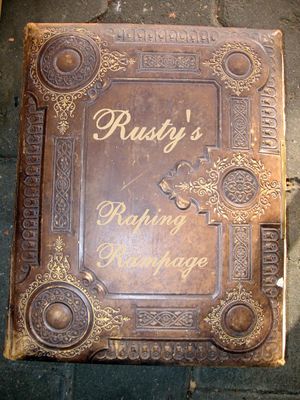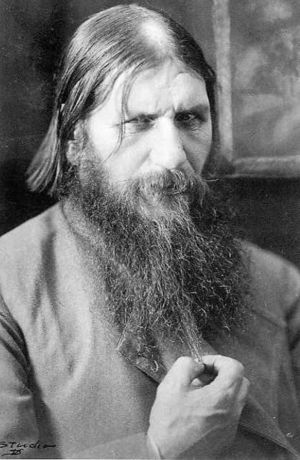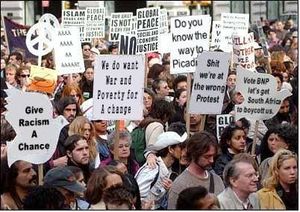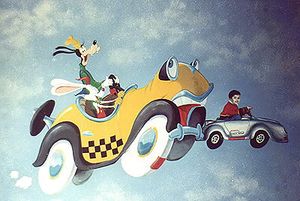Rusty's Raping Rampage
“All aboard!”
Rusty's Raping Rampage is a collection of memoirs by American author Ronald "Rusty" Bangitup chronicling Rusty's adventures as a train conductor who also happened to be a serial rapist. Originally published in weekly installments for the Christian journal Hell Watch in 1865, the memoirs were praised by critics as some of the greatest things ever produced by man, one describing it as "like The Bible, only with more anal sodomy".
The full edition, now known as The Un-penetrated Rusty, sold poorly, however, and it was nearly forgotten until modern rapist van operators caught wind of it. Rusty's Raping Rampage has now been named a literary masterpiece, and as of 2005, it has sold ten jillion copies. [It's not a joke, dammit]
Background[edit | edit source]
During the nineteenth century, the railroad industry was booming. Hundreds of trains were being built and traveled on, and though a good percentage of them were used for their intended purposes, those who were as imaginative as they were horny utilized the steam giants to lure in unsuspecting passengers and "rape the eyeballs out of their skulls", as one historian described.
The term "railroad rape" was coined for this phenomenon, and though there aren't any reliable statistics for how many railroad rapists were out there at the time, it was estimated that there were "like eleventy hundred", as another historian described.
Rusty was one of the more successful railroad rapists, and after he retired, he decided to put his achievements to paper for the knowledge of generations of professional sex offenders that would follow. Unfortunately, the market for rape tales was smaller than he hoped, and he was forced to settle with the struggling Christian journal, which was glad to take the stories on the one condition that Rusty grow out a beard to look more like Jesus.
Rusty's Raping Rampage got the journal the sales figures they wanted, but when Rusty trimmed his beard for an upcoming date with a lady of ill reputation, they had no choice but to send missionaries over to Rusty's house to kill him in his sleep. Rusty was never heard from again.
Because he was dead and could not speak.
Characters[edit | edit source]
Despite being autobiographical, Rusty's Raping Rampage is said to have quirkier personalities than any work that preceded it, even those of mythology, "which, let's face it, had some pretty boring-ass characters", said a columnist of a high school newspaper.
Rusty is a charming, smart, and perverted train conductor. Considered one of literature's greatest anti-heroes, Rusty offers random pedestrians free rides and proceeds to violently rape whoever takes him up on the offer. When he's not on the lookout for victims, he's arguing with Crusty and smoking pixie sticks.
Crusty is the Texas hillbilly that drives the train. He often expresses annoyance at Rusty's antics, and he gets especially upset about the fact that he always has to clean up his messes. He likes to cuss and drink beer, and he claims to have fought an alligator once.
The Po-Po are the antagonists in the memoirs. They always pop up at the wrong times, and Rusty ends up having to bribe them with money, drugs, and hookers. Once time, he has to take a policeman's daughter to Disneyland in exchange for his silence, and the girl pisses him off so much that he turns himself in.
Foxy Grandma is a crazy old woman who, after Rusty picks her up, ends up raping him and Crusty and almost hijacks the train before Rusty knocks her out with a wooden spoon and throws her off the train. Foxy Grandma appeared later to have her revenge, but Crusty shot her, and her last appearance was as Rusty's "nightmare ghost of Christmas and shit".
Themes[edit | edit source]
Like most classics, Rusty's Raping Rampage has many complex and confusing themes. These themes have been organized and made no less confusing in this section of the article.
Rape[edit | edit source]
Many scholars have agreed that this is a book about rape. Rusty was most likely not mistaken when he put the word "raping" in the title. This book has a lot of raping in it, especially by Rusty. This is a book about rape. However, the psychological effects of rape on its victim is also a prominent subject. A Wheeling Jesuit University professor explained: "Rusty must be thinking, 'How do the victims feel about the fact that I'm violating them in more than two ways?' That's what I think whenever I rape someone, and it's really something to think about."
Tolerance[edit | edit source]
Especially groundbreaking about these memoirs is how willing Rusty is to rape anyone, regardless of race, age, or gender. Many believe that this lack of discrimination was a call to equality, and that led to Rusty getting accepted into the Civil Rights Hall of Fame alongside Abraham Lincoln, Martin Luther King Jr., and the black guy from Sesame Street. The presence of homosexual rape in the book gets it attention from LGBT organizations, too. The Fraternity of Angry Gay Stylists (FAGS) in particular stresses that if young people everywhere read Rusty's Raping Rampage, we'll finally have world peace.
Women's rights exist, too.
Drinking and driving[edit | edit source]
Crusty regularly drinks beer while at the wheel of the train, and not a single accident was recorded throughout the course of the book, suggesting that both Rusty and Crusty didn't take the drinking and driving laws seriously. "The whole thing is a joke, and Rusty's Raping Rampage is proof of that," says an unconcerned reader, "Crusty didn't crash, so why should I think I will?" Like The Catcher in the Rye encourages people to kill celebrities, this book is said to encourage people to stop stressing about what they should and shouldn't do when they drive and just drive, a message that teenagers say have had a positive influence on them overall.
Controversy[edit | edit source]
Issues were raised about Crusty's use of bad words and the relaxed nature of the dialogue in general. Words like "butthole surfer" and "dog poop" can be found scattered through the memoirs, and due to this, public school libraries put their copies at the top of shelves so kids would have to work really hard to get them. Some librarians have proposed banning them entirely, but those librarians were immediately fired and sent to psych wards.
The International Censors of Unbecoming Property (ICUP) suggested taking out all the bad words and replacing them with good ones, but at a loss of what to replace "foot sniffer" with, they gave up. George Dubya Bush himself attempted measures to "fix" the book, but when the plan's ten dollar budget ran out, he was forced to abandon that, too.
Critic Wells Wuzzlebottom expressed horror at this lack of action, citing its obvious appeal to children. "I mean, come on! Do you expect a book with the name 'Rusty's Raping Rampage' to be anything but kid friendly? There's alliteration! You don't see alliteration in grown up books!"
Critic Buzzle McBuffkees responded to that comment with indifference. "It's only a few bad words. Besides that, there's nothing about the book you can really object to, and I've seen a lot worse. Anyone remember 'Where the Wild Things Are?' Yeah, that was really fucked up."
Adaptions[edit | edit source]
There's been twenty six feature films, nine radio programs, thirty television series, nine hundred and ninety nine comics, and one George Carlin routine based on the book. Elton John attempted to spin it off into a musical play, but the production was so disastrous that bringing it up in interviews has caused him to murder reporters on the spot. A theatrical spawn has never been suggested again.
Film[edit | edit source]
Walt Disney's animated adaption of the book is by far its most famous. Rusty is portrayed in the film as a down-on-his-luck orphan who has ugly lesbian stepmothers who make fun of his Jewish nose. After running away, Rusty meets Crusty at a bar and suggests that they team up and start a railroad raping business. Drunk out of his mind, Crusty agrees, and they're led by singing animals to an abandoned train in the forest. Crusty drives the train while Rusty rapes whomever he can manages to pick up, and that somehow leads to a profit.
At the climax of the film, Crusty threatens to quit, so Rusty teaches him the magic of friendship through the Oscar-nominated song "Raping Sprees Take Two". After singing that, he sees a beautiful princess walk by, but after raping her, he realizes that he wants more in life. Crusty, assured of his and Rusty's friendship, holds the princess at gunpoint while she and Rusty get married. They all live happily ever after and end the movie with the Oscar-winning musical number "Raping Sprees Take Three".
Rusty's Raping Rampage was Disney's first PG-rated movie, and despite skepticism from parents about taking their children to a movie with frequent, uncensored rape, the pretty colors won them over, and Disney's Rusty's Raping Rampage became the highest-grossing film of 1943. Another film adaption by Stanley Kubrick had less singing animals, but it made money, too.




